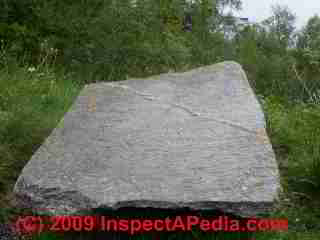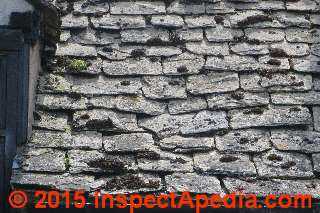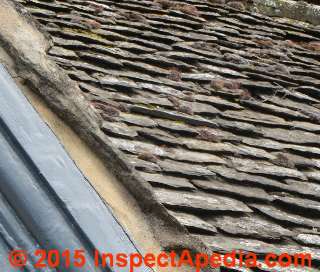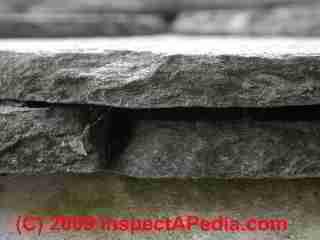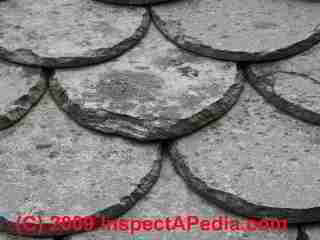 Stone Roofing Design Details, Photos
Stone Roofing Design Details, Photos
- POST a QUESTION or COMMENT about stone roofs: the historic & current use of stone on building roofs, inspection, diagnosis, installation, mantenance, & repair of stone roofing
Stone roofs:
Here we illustrate and discuss stone roofing in historic and contemporary use. Our page top rooftop photo may look like slates, but this is a stone roof, not slate.
We mean literally, stone, cut either in giant slabs or stone cut into tiles that might be mistaken for gray slate, but are of different mineral composition. These are stone roofs, not slate roofs.
InspectAPedia tolerates no conflicts of interest. We have no relationship with advertisers, products, or services discussed at this website.
- Daniel Friedman, Publisher/Editor/Author - See WHO ARE WE?
Stone Roofing Examples, Ancient and Old Stone Roof Designs
While our page top photograph shows a modern cut stone roof, our photo at above left points out that the earliest stone roofs often used a single huge stone slab (photo at left), set atop a stone or wood or earthen structure. In this photo the stone roof slab is no longer in use but has been preserved along a hiking trail above Molde, Norway.
[Click to enlarge any image]
Where particular geology made it easy to split stones into large slabs or where such flat stones were produced by nature, they formed a natural building material.
Our photo of a stone tower roof (above) represents the transition between the megalith stone slab roof used (we guess) from Paleolithic times to modern cut stone roofing. Large stone slabs, many several feet across, but split thinner than the slab at above left, were used to form a random stone slab-tile roof on this antique building tower.
Antique Stone Roof Details
Moving right along from paleolithic times to examples of very durable stone roofs of more moden vintage we take a look at buildings just a few hundred years old.
Shown above and in closer detail below is a stone-roofed inn in Wolvercote, Oxford in the U.K.
And below we see how the roofer sealed the stone roof at the building's gable-ends.
Modern Stone Roof Tile Details
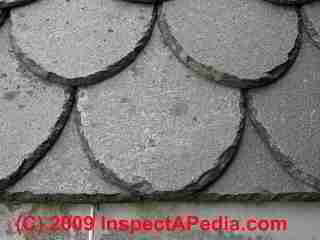
Our photo (above left) shows a typical modern stone roof design. Flat stones are quarried and cut into scalloped, diamond, rectangular, and other regular shapes and applied using methods similar to slate roofing.
However as our photo of stone roof tile thickness suggest above, these roofs are usually even heavier than slate and require a substantial supporting structure.
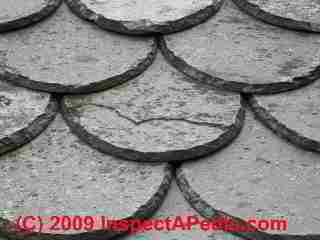
Our photos show a minor surface delamination of a stone roofing tile (above left) and a chipped stone roof tile (above right).
These are cosmetic defects. Provided the fasteners and supporting structure remain intact, this roof may last for 100 years. About that black fungus, lichens, or algae on the stone roofing in our photos above?
This website provides un-biased articles about many common roofing materials, installations, inspection, defects, roofing repairs, and products.
...
Continue reading at STONE CLEANING METHODS or select a topic from the closely-related articles below, or see the complete ARTICLE INDEX.
Or see these
Recommended Articles
- DEBRIS STAINING on ROOFS
- SLATE ROOF INSPECTION & REPAIR - slate is the most common type of "stone" roofing used in Europe & North America.
- SNOW GUARDS & SNOW BRAKES
Suggested citation for this web page
STONE ROOFING at InspectApedia.com - online encyclopedia of building & environmental inspection, testing, diagnosis, repair, & problem prevention advice.
Or see this
INDEX to RELATED ARTICLES: ARTICLE INDEX to BUILDING ROOFING
Or use the SEARCH BOX found below to Ask a Question or Search InspectApedia
Ask a Question or Search InspectApedia
Try the search box just below, or if you prefer, post a question or comment in the Comments box below and we will respond promptly.
Search the InspectApedia website
Note: appearance of your Comment below may be delayed: if your comment contains an image, photograph, web link, or text that looks to the software as if it might be a web link, your posting will appear after it has been approved by a moderator. Apologies for the delay.
Only one image can be added per comment but you can post as many comments, and therefore images, as you like.
You will not receive a notification when a response to your question has been posted.
Please bookmark this page to make it easy for you to check back for our response.
IF above you see "Comment Form is loading comments..." then COMMENT BOX - countable.ca / bawkbox.com IS NOT WORKING.
In any case you are welcome to send an email directly to us at InspectApedia.com at editor@inspectApedia.com
We'll reply to you directly. Please help us help you by noting, in your email, the URL of the InspectApedia page where you wanted to comment.
Citations & References
In addition to any citations in the article above, a full list is available on request.
- In addition to citations & references found in this article, see the research citations given at the end of the related articles found at our suggested
CONTINUE READING or RECOMMENDED ARTICLES.
- Carson, Dunlop & Associates Ltd., 120 Carlton Street Suite 407, Toronto ON M5A 4K2. Tel: (416) 964-9415 1-800-268-7070 Email: info@carsondunlop.com. Alan Carson is a past president of ASHI, the American Society of Home Inspectors.
Thanks to Alan Carson and Bob Dunlop, for permission for InspectAPedia to use text excerpts from The HOME REFERENCE BOOK - the Encyclopedia of Homes and to use illustrations from The ILLUSTRATED HOME .
Carson Dunlop Associates provides extensive home inspection education and report writing material. In gratitude we provide links to tsome Carson Dunlop Associates products and services.


